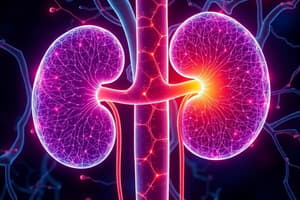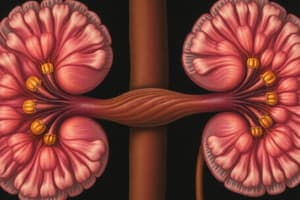Podcast
Questions and Answers
Which organs are involved in excretion by eliminating solid, liquid, and gas wastes?
Which organs are involved in excretion by eliminating solid, liquid, and gas wastes?
Kidneys, skin, lungs, gastrointestinal tract
What is the role of nephrons in the excretory system?
What is the role of nephrons in the excretory system?
To filter blood by retaining and eliminating substances as urine
How do lungs participate in excretion?
How do lungs participate in excretion?
By releasing carbon dioxide during the breathing process
Which hormone helps regulate the amount of water in our bodies?
Which hormone helps regulate the amount of water in our bodies?
What is the purpose of the excretory process in living organisms?
What is the purpose of the excretory process in living organisms?
What is the main function of the excretory system?
What is the main function of the excretory system?
What are some substances found in sweat produced by sweat glands?
What are some substances found in sweat produced by sweat glands?
What happens to indigestible remnants after digestion completes nutrient absorption in the small intestine?
What happens to indigestible remnants after digestion completes nutrient absorption in the small intestine?
How does water loss through sweating help the body?
How does water loss through sweating help the body?
What causes osmotic diarrhea in the colon?
What causes osmotic diarrhea in the colon?
What is the role of excretion in promoting good health?
What is the role of excretion in promoting good health?
Why is excretion considered more diverse and interconnected among different bodily systems?
Why is excretion considered more diverse and interconnected among different bodily systems?
Flashcards are hidden until you start studying
Study Notes
Life Processes: Understanding Excretion
Excretion is one of the fundamental life processes shared by all living organisms. Just like eating, growing, and reproducing, it's essential for maintaining health and homeostasis within our bodies. This process involves getting rid of waste products and excess materials to ensure harmony between cells and systems inside us.
In its most basic form, excretion can be thought of as removing unnecessary substances from the body through specialized organs such as kidneys, lungs, skin, and gastrointestinal tract. These organs work together to eliminate solid, liquid, and gas wastes via urine, sweat, breath, and feces respectively.
Let's delve into some specific aspects of this vital process:
Kidney Filtration
Kidneys play a central role in the excretory system. Their tiny filtering units called nephrons continuously clean blood by allowing useful molecules and water to pass while retaining and eliminating unwanted substances as urine. Hormones such as antidiuretic hormone (ADH) help regulate how much water remains in our bodies.
Lung Gas Exchange
The respiratory system also participates in excretion by releasing carbon dioxide, a resultant product of metabolism, during the breathing process. Inhalation brings oxygen into the lungs, which diffuses across alveolar walls to reach red blood cells for transport throughout the body; simultaneously, wasted carbon dioxide moves outwardly to exit the body with expired air.
Skin Secretions
Although we don't typically think of the skin as part of the excretory system, it does contribute to the removal of waste products by secreting moisture, salts, and various other substances. Sweat glands produce perspiration containing sodium chloride ions, lactic acid, urea, ammonia, and sometimes uric acid. Water loss through sweating helps cool down the body when heat stress occurs.
Gastrointestinal Tract Elimination
Digestive and excretory functions share a significant overlap because both involve ingested food matter being broken down and processed before disposal. After digestion completes nutrient absorption in the small intestine, indigestible remnants known as fiber, cellulose, hair, nails, etc., collectively termed fecal material or stool, accumulates until they are eliminated through defecation.
Excess fluids and electrolytes are another type of waste removed through fecal matter. For example, unabsorbed glucose and vitamins can cause osmotic diarrhea due to high concentrations of these compounds entering the colon, resulting in water retention and subsequent fluid discharge.
As you can see, excretion is more diverse and interconnected among different bodily systems than once imagined. It plays a critical role in promoting good health—and without it, we wouldn't survive—so remember to appreciate the miraculous ways your body keeps itself running smoothly!
Studying That Suits You
Use AI to generate personalized quizzes and flashcards to suit your learning preferences.




